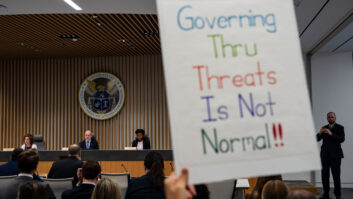Citing links to the Chinese government, the Federal Communications Commission has said no, at least for now, to an application to deliver Mandarin Chinese content from a studio in California to a radio station in Mexico for rebroadcast back into the United States. And it ordered a halt to the arrangement within 48 hours.
This is the latest twist in a story that has been making headlines for a couple of years. The setup — allowed under a previous special temporary authority — has been the subject of complaints from a low-power FM station that serves the Chinese-American community and, more prominently, from critics like Sens. Ted Cruz and Marco Rubio who are worried about national security.
The LPFM station has argued that the cross-border deal was “unlawful,” that one of the companies involved is a front for the People’s Republic of China and that the programming is propaganda targeting the large Mandarin-speaking population in the Los Angeles area — allegations that the companies have denied. Meanwhile Sen. Cruz has pushed for legislation to flatly block cross-border broadcasts by entities associated with the Chinese government.
In dismissing the application to deliver content from Irwindale, Calif., to AM station XEWW in the Tijuana/Rosarito area, the FCC did not comment on the content of the programming, and it left the door open to reviewing the situation once it knows more about the companies involved. But it did use the phrase “California studio with links to Chinese government.”
The original application came from GLR Southern California and its parent H&H Group USA, which took an ownership stake in the Mexican AM station two years ago. “The application was dismissed because the parties failed to include in their application a key participant, Phoenix Radio, which produces the Mandarin programming in its studio,” the commission said in a press release highlighting its decision.
“Phoenix Radio is partially owned by two entities with Chinese government ownership, Extra Steps Investment Limited and China Wise International Limited … Phoenix Radio’s known activities at this broadcast programming studio are such that, without reviewing its role as an applicant, the FCC could not evaluate the proposed service.”
The applicants in early 2019 did file an extensive document replying to FCC questions about its business arrangements that included some descriptions of the role of Phoenix. The bureau says now that if a revised application is filed that includes Phoenix Radio, the commission “would review it under applicable law.”
GLR Southern California and H&H Group USA told the commission in 2018 that this arrangement is “not a front” for the Chinese government, and that even if the commission evaluated content, “it would find the programming leaves no room for propaganda.” They have said that the FCC has reviewed “countless programming arrangements that are legally and functionally indistinguishable” from this one.
In that same filing, they said that the LPFM that objected to the arrangement “bases its arguments on wholly unsupported allegations of improper influence in a self-serving effort to protect itself from competition to the Southern California Chinese-speaking American audience. There is a history, and always a danger, that in times of insecurity citizens and the government will make harmful generalizations about race, language and ethnic heritage. … The facts are that the station is carrying programming produced by a publicly traded company that provides Chinese-language programming around the world, including throughout the United States to major TV distributors.” But those arguments have not sufficed to convince the FCC to allow the arrangement to continue, at least for now.







